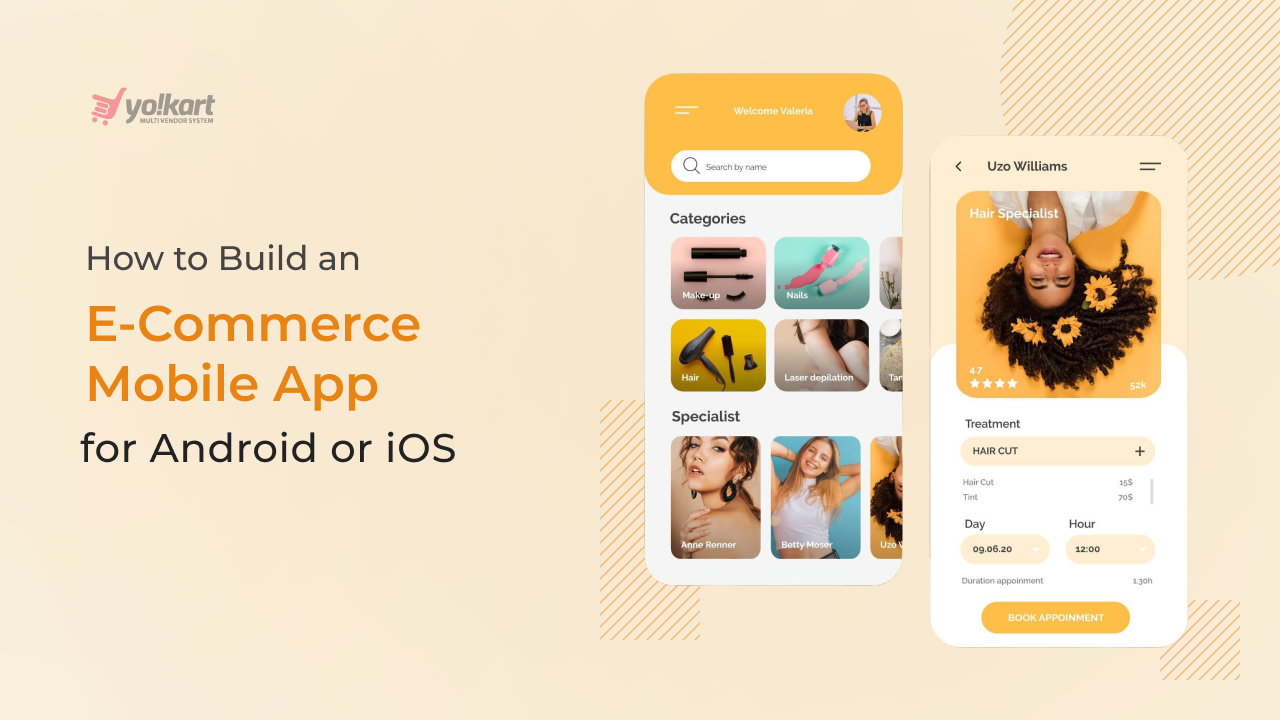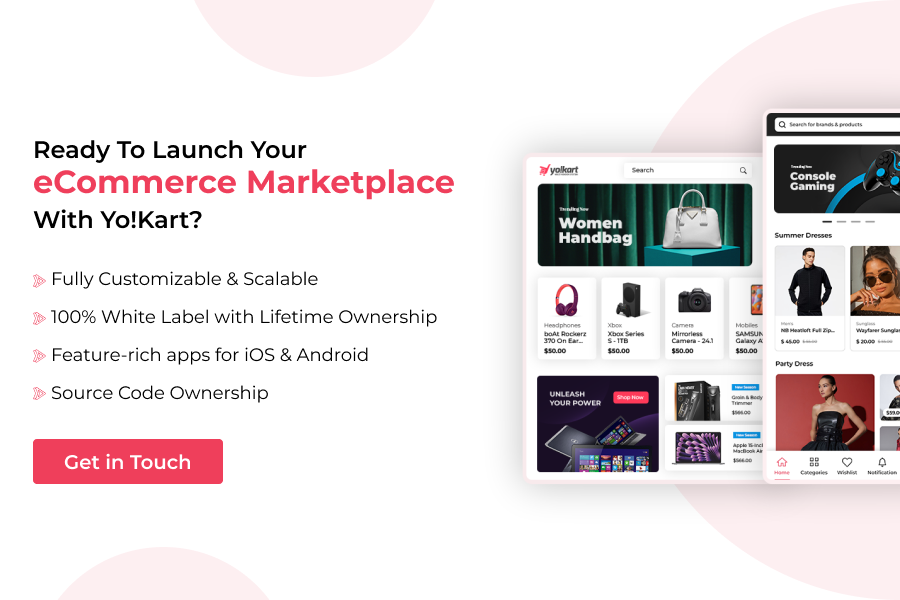Published on 10th Dec, 2024
The significant rise in eCommerce through mobile application sales is a testament to the increasing dependency on eCommerce mobile apps for online shopping. In terms of numbers, the M-commerce growth rate is higher than that of e-commerce worldwide. According to Statista, mobile eCommerce sales reached $2.2 trillion in 2023, accounting for 60 percent of all e-commerce sales worldwide. The insights also reveal that mobile e-commerce sales are expected to reach $3.4 trillion, reaching new heights of 62 percent.
It is not surprising that m-commerce will lead the eCommerce industry in the upcoming years. The way the eCommerce industry is shifting towards offering their product and services via eCommerce mobile applications, m-commerce will play a crucial role in revenue generation in the eCommerce industry. In addition to this, about 78% of e-commerce customers prefer apps for placing orders online. Therefore, launching mobile apps for your eCommerce business can be a game-changing approach towards your business success.
If you are an entrepreneur or business looking for detailed information and insights about launching eCommerce mobile apps, this informative blog can be your one-stop destination. It will help you understand what is an eCommerce mobile app, its types, benefits, essential features, and key considerations for building an eCommerce app. In addition, you will also explore the best ready-made multi-vendor eCommerce app solution.
Table Of Contents
- What is an eCommerce Mobile App?
- Types of eCommerce Mobile Apps Leading the Market
- The Future of Mobile Apps in the eCommerce Landscape
- Top 10 eCommerce Marketplace Apps Worldwide
- Top 10 Essential Features of eCommerce Mobile Apps
- What are the Advantages of eCommerce Mobile Apps?
- What are the Steps to Launch an eCommerce Mobile App?
- Launch Your eCommerce Mobile App with Yo!Kart
- 4 Easy Steps to Launch Your Readymade eCommerce Marketplace App with Yo!Kart
- Final Thought
- FAQs
What is an eCommerce Mobile App?
An eCommerce mobile application software allows customers to browse and order products or book services on-the-move through their smartphones. It offers a more personalized and seamless shopping experience leading to repeat sales and an increase in customer loyalty. eCommerce apps aim to provide a user-friendly interface, reliable payment options, seamless navigation, ease of online transaction, and additional features and functionalities, enhancing overall online presence. From a business standpoint, they are completely designed preferring users, their intuitive design, easy-to-access features, and simple-to-use functionalities to enhance engagement and generate more revenue. Moreover, the personalization and prevalence of mCommerce demonstrate enormous potential.
Take a look at the table below to comprehend the mobile commerce revenue and share of total e-commerce worldwide from 2018 to 2027, according to the Statista report.
| Year | M-commerce Revenue (Global) | Annual Growth Rate | Share of total Retail eCommerce |
|---|---|---|---|
| 2019 | $1166 billion | 18.7% | 57% |
| 2020 | $1530 billion | 31.2% | 57% |
| 2021 | $1922 billion | 25.6% | 58% |
| 2022 | $1922 billion | 1.1% | 59% | 2023 | $2169 billion | 11.5% | 60% |
| 2024 | $2522 billion | 16.3% | 60% |
| 2025 | $2976 billion | 18.0% | 61% |
Types of eCommerce Mobile Apps Leading the Market
Based on use cases, there are several types of eCommerce mobile applications available in the market. They allow users to perform various online transactions, such as ordering products and booking cabs, tickets, hotels, and so on. However, based on their businesses and target audience, these apps can be divided or classified into three types.
1. B2B eCommerce App (Business-to-Business): These apps aim to offer products and services from one business to another. They help businesses to place and process orders, manage workflows, and fulfill other requirements in terms of products and services available with the application.
- Popular Examples: Alibaba and Amazon Business
2. B2C eCommerce App (Business-to-Consumer): The B2C eCommerce applications account for the largest market capitalization in the eCommerce industry. They connect businesses with customers in order to offer products and services on demand. B2C apps primarily focus on user-centric features and functionalities.
- Popular Examples: Amazon and eBay
3. C2C eCommerce App (Consumer-to-Consumer): C2C mobile application works as a medium that facilitates transactions between customers. It allows one customer to sell products or offer services to another. The involvement of businesses or commercial organizations is not required, consumers can buy and sell products or services directly from each other.
- Popular Examples: Etsy and Poshmark
The Future of Mobile Apps in the eCommerce Landscape
The internet always surprises us with its evolution. In October 2024, 5.52 billion internet users were reported worldwide, which is 67.5% of the global population. This impressive figure indicates that the majority of people are using the Internet and represents healthy momentum in Internet adoption.
However, if we talk about the most remarkable figure, we will find that 96.2 percent of internet users use mobile phones to go online. It shows that most internet users are using mobile devices and are in the supermajority.
Again, apart from the above data on internet and mobile users, one should not ignore that a large number of online shoppers prefer to place orders through their mobile devices compared to any other source. Therefore, building an eCommerce mobile app for your eCommerce marketplace can be profitable as a majority of people use and prefer mobile devices. Moreover, you can explore the below data on the adoption and use of mobile devices.
Top 10 eCommerce Marketplace Apps Worldwide
There are a number of mobile applications leading to the eCommerce industry. Let’s explore the top 10/5 marketplace apps leading the industry worldwide:
| eCommerce App | Active Mobile App Users | Services |
|---|---|---|
| Amazon | 200 million | Amazon is a global eCommerce platform that offers all types of products (from physical to digital) to customers worldwide. |
| Walmart | 120 Million | Walmart’s top-selling product categories include baby care, personal care, kitchenware, groceries, and laundry. |
| Meesho | 120 Million | Women’s wear, men’s apparel, Kid’s dresses, jewelry, kitchen items, electronic appliances, and home decor products are the most selling categories on Meesho. |
| Flipkart | 82 Million | Flipkart has a wide range of products including electronics, fashion, furniture, groceries, toys, books, etc. | eBay | 80 Million | Sells products such as clothing, shoes & accessories, health & beauty, collectibles, watches etc. |
| Wish | 75 Million | Wish connects buyers directly with sellers and sells a variety of products including clothing, electronics, home decor, and more. |
| Alibaba | 70 Million | Alibaba is a wholesale marketplace that connects businesses with manufacturers, suppliers, and wholesalers to trade all types of products. |
| Shein | 65 Million | Shein is an online retailer that sells a variety of products such as clothing, electronics, household appliances, and more. |
| Etsy | 50 Million | Etsy is an online marketplace that connects buyers with sellers, popularly known for selling second-hand clothing, and handmade and unique products. |
| Zalando | 45 Million | Zalando offers a multi-brand shopping experience for customers, it primarily sells products including fashion, shoes, and beauty. |
Want to Launch a Marketplace App like Amazon, eBay, or Etsy?
Top 10 Essential Features of eCommerce Mobile Apps
eCommerce mobile apps are now lifestyle choices. Users found it easier to shop online compared to a desktop or any other device. Online shopping options are now available at their fingertips. eCommerce mobile apps allow users to place an order just with a few touches. However, by considering the potential of eCommerce apps, businesses are launching their mobile applications preferring customer preferences. Let’s check out 10 must-have eCommerce mobile app features to offer unmatchable customer experience in order to achieve your business goals:
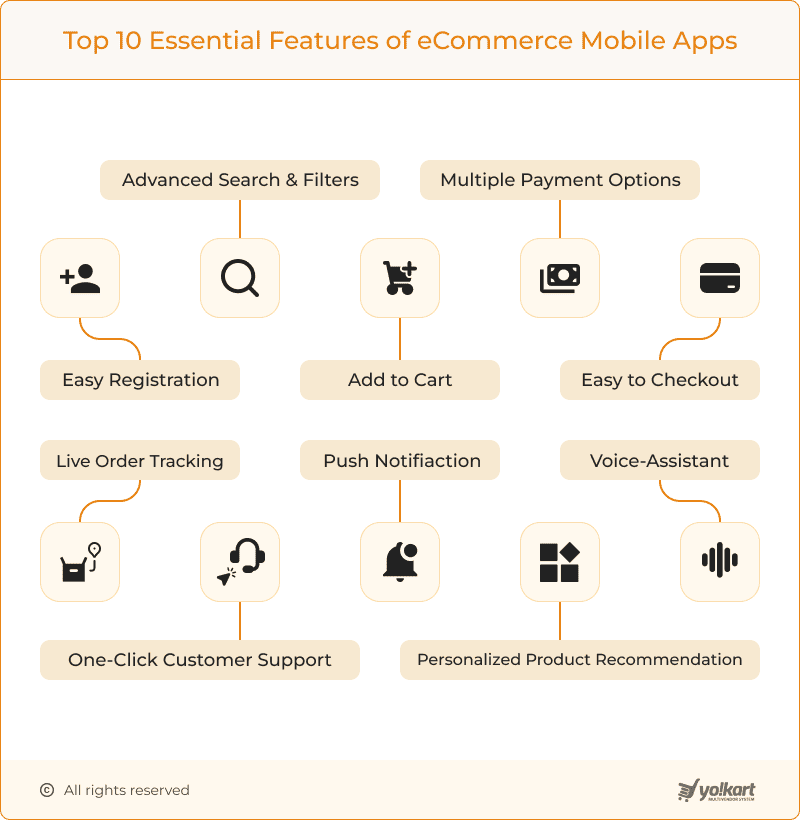
1. Easy Registration: First impressions always matter the most and registration is the entry point to the application. An easy and hassle-free registration process attracts customers with a seamless user experience. It reduces the chances of drop-offs and increases the chances of higher sales. To simplify the registration, you can provide social login options such as Gmail accounts, Facebook Accounts, or mobile numbers with 2-factor authentication (2FA).
2. Advanced Search and Filter: These features are crucial for online stores with extensive product catalogs. They help users find products that they are looking for. Users can browse the exact products from an extensive number of products using the filter option. They can apply filters on product category, size, price, brand, material, discounts, color, new launches, and more.
3. Add-to-Cart: The Add-to-Cart feature allows buyers to easily select and add items they are interested in without pushing them to make purchases immediately. It helps them to browse more products before making a purchase and contributes to increasing the conversion rate. Moreover, one can add multiple products to the online shopping cart and proceed to checkout or remove them later as per their preferences.
4. Easy to Checkout: A simplified checkout feature leads to increased sales and a satisfied customer shopping experience. A quick and hassle-free checkout can significantly impact revenue generation in eCommerce. In mobile commerce apps, guest checkout options, one-click payment options, minimal shipping information feed, and fetching information from profiles can help businesses to set up an effortless checkout process.
5. Multiple Payment Options: Offering multiple payment options in an eCommerce app is a smart way to increase sales and earn customer loyalty. It helps platforms reduce abandoned cart rates, set businesses apart from competitors, and reduce the friction of the checkout process. Popular payment options include payment gateways like PayPal, Stripe, Amazon Pay, Paytm, and debit/credit card, digital wallet payment, or COD.
6. Order Tracking: Order tracking is one of the essential features of an eCommerce mobile app that excites buyers to check the current status of their orders until they are delivered. On the other hand, real-time tracking also improves engagement and increases sales. Often buyers visit eCommerce apps to track their order and make another purchase while finding something useful to them.
7. One-Click Customer Support: Redundant steps and poor customer support can damage a business’s reputation and cause customer dissatisfaction. It seems like solving a puzzle instead of finding someone to discuss concerns. However, one-click customer support helps customers resolve their queries, and businesses to earn loyal customers. A chat support icon is one of the popular customer support options these days. It allows customers to feel like a person is always with them for their queries.
8. Push Notifications: Push notification continues to be a go-to marketing feature. It allows businesses to reach out to their potential customers to increase conversion rates. According to Wisernotify, the open rate of push notifications is 90%, and 28% of mobile app users who click a push notification finish a purchase. It notifies about customer’s order confirmations, shipping updates, exclusive offers, hot flash sales, new arrivals, review requests, and more.
9. Voice assistant: The voice assistant is skyrocketing in eCommerce mobile apps these days. It makes interactions more intuitive and provides faster responses, using natural language processing (NLP). NLP in voice assistant grasps the user’s intent and allows a device to understand and respond to human speech improving the overall customer experience. Moreover, the convenience of voice assistance and the speed of real-time response boost customer satisfaction.
10. Personalized Product Recommendation: Personalized recommendations mean offering products to customers according to their requirements, interests, and preferences. This strategy helps businesses target their potential buyers and increase conversion rates by displaying products they are interested in. It is something like visiting a shop and the shopkeeper knows what you exactly want to purchase, preferring your taste and choices.
Additional Features of eCommerce Mobile Apps
The mobile app’s features list is extensive, and your mobile application doesn’t require all the features. However, six additional features below are quite popular in the eCommerce industry and are booming these days. They are also helping businesses increase sales, earn customer loyalty, and so on. Therefore, let’s explore six more popular additional features that offer a seamless user experience and make users keep returning:
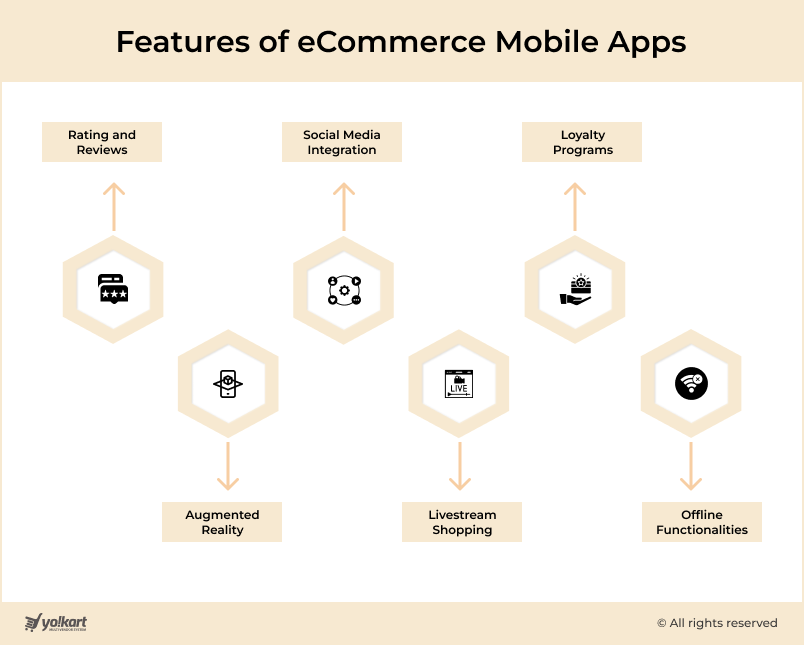
- Rating and Reviews: Ratings and reviews are some of the most useful features for all user types. They help customers in building trust, providing valuable feedback to the sellers, and marketplace owners about their products and services.
- Social Media Integration: Social media integration into an eCommerce marketplace can have many benefits including increased customer engagement, customer loyalty, brand awareness, and more.
- Loyalty Programs: In loyalty programs marketplace offers discounts, cash back, coupons, or gift cards to repeat and new customers. They help businesses to attract customers for repeat sales, generate more revenue, improve brand reputation, and increase customer engagement. It also attracts customers to the platform and encourages them to make purchases.
- Augmented Reality: AR technology is an interactive feature that bridges the gap between online and in-store shopping. This feature allows customers to visualize products in their space before they make a purchase. AR reduces uncertainty in online shopping, boosts conversion rates, and reduces return rates.
- Livestream Shopping: Live streaming eCommerce is paving the way for a revolutionary change in the eCommerce industry. Video has always been one of the powerful strategies to drive sales and engagement. In the same way, the trend of live streaming is transforming the online shopping experience by attracting more customers compared to any other form of content.
- Offline Functionalities: Offline functionalities in an eCommerce mobile app offer seamless access to the features and functionalities even when they don’t have internet connectivity. It allows users to access the apps anytime, anywhere without any interruptions. Moreover, offline functionalities not only improve user experience but also increase app retention and engagement rates.
What are the Advantages of eCommerce Mobile Apps?
Today, mobile applications are not just an option for generating revenue but a core competence of businesses. They are now the key elements of any online business strategy. In the eCommerce landscape, you cannot ignore the significance of m-commerce. The way it is contributing to eCommerce, mobile apps are becoming a necessity instead of just an option. Let’s explore a few advantages of mobile apps for eCommerce business:
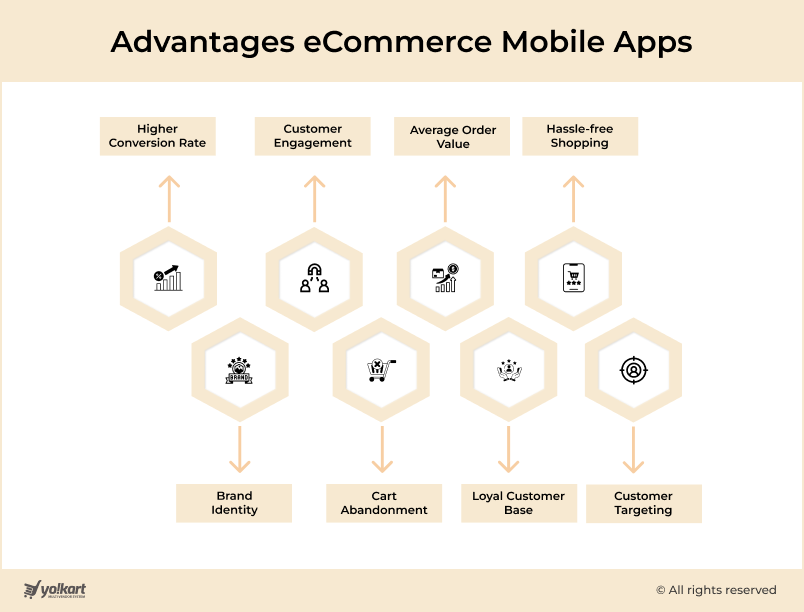
1. Higher Conversion Rate: Mobile eCommerce apps lead to higher conversion rates compared to web apps. They offer easy product navigation, an easy checkout process, and secure payment options that encourage buyers to complete purchases. Moreover, the enhanced app performance reduces customer frustration and increases the overall shopping experience.
2. Boosts Customer Engagement: Apps help businesses maintain a connection between business and customers. They leverage a push notification feature to keep customers informed about new arrivals, special offers, discounts, or any other product-related updates fostering continuous engagement and interactions with the customers.
3. Increases Average Order Value: eCommerce mobile apps provide personalized product recommendations, smart cross-selling, and easy-to-access deals by analyzing customer preferences. The recommendations of relevant items motivate customers to explore more products and make purchases contributing to increased Average Order Value (AOV).
4. Hassle-free Shopping Experience: Mobile apps streamline the overall shopping journey for customers to provide a hassle-free experience. Customers can easily find and browse products, access information, add shipping addresses, save card and payment details, or seamlessly integrate digital wallets with shopping mobile apps. Moreover, these eCommerce mobile applications minimize the need for manual data entry and simplify the checkout process.
5. Improves Brand Identity: A well-designed mobile app serves as a powerful branding tool for the business. It reflects a company’s qualities, values, and aesthetics through customized interfaces, consistent color schemes, themes, and unique designs. Apps provide a more immersive brand experience compared to mobile websites and help businesses create brand awareness.
6. Reduces Cart Abandonment Rates: Mobile apps allow businesses to implement smart features like saved carts, instant checkout, multiple payment options, and timely reminders through push notifications. These features and functionalities help customers complete the purchases they might otherwise abandon. Moreover, personalized notifications lower the chances of losing potential sales contributing to reduced cart abandonment rates.
7. Builds a Loyal Customer Base: eCommerce mobile applications foster customer loyalty through personalized experiences, reward programs, exclusive deals, and easy account management. By providing value beyond transactions and creating a sense of community only with eCommerce mobile apps helps businesses develop long-term relationships with their customers and stable a loyal customer base.
8. Improves Customer Targeting Capabilities: Mobile apps provide valuable data to businesses by analyzing user behavior, preferences, and purchase patterns. Businesses can plan their marketing strategies and target precise customer segments. They can create and run highly personalized marketing campaigns that resonate with different customer cohorts.
What are the Steps to Launch an eCommerce Mobile App?
Before you launch an eCommerce mobile app, you need to understand and follow the right steps to launch your eCommerce mobile app. Let’s explore the steps below for a better understanding:
1. Market Research: Market research is the first step in building a successful eCommerce mobile app. It helps businesses identify market gaps and their target audience. This process involves deep research into demographics, customer shopping behaviors, specific requirements, and technical expertise. However, you can also consider factors like age groups, income, preferred devices, and typical purchase patterns to define your target market.
2. Define Business Goal: After doing proper market research, you will be able to understand and answer the questions including what are market gaps, who are your target audience, how your solution will work for them, and what will be your business success parameters. The answers to the above questions will help you define your marketing strategies and business objectives or goals.
3. Mobile App Selection: The selection of the right solution is crucial for eCommerce mobile app success. To decide your platform, you can consider your budget, target audience, age group, device preferences, device compatibility, and more. In addition to these considerations, don’t ignore the importance of customization options and scalability features in the long run.
4. Define Features and Functionalities: Once you are done with the selection of your eCommerce mobile application, the next step is to define features and functionalities in your mobile app. However, market research is one of the best ways to define features and functionalities. This research will help you gather feedback about the challenges customers are facing with the competitor apps, additional features, and functionalities needed, and so on. You can investigate the level of customer satisfaction of those users who are already using competitor’s mobile apps.
5. Build an MVP: Building an MVP (Minimum Viable Product) is one of the time-tested methods to validate a business idea. You can introduce your eCommerce mobile app with minimum and essential features in less time and budget. It gives you the flexibility to come back and fix issues, tackle challenges, understand customer behavior, analyze product acceptance percentages, and rework business ideas or products.
6. Collect Feedback: You can gather feedback and implement it with the final product which can help you mitigate the risk of big losses. Feedbacks allow you to find the gaps and improvement areas where you need to work to improve the overall customer experience. The continuous implementation of feedback will help you launch a final product that can meet customer’s expectations.
7. Launch Your Mobile App: Once you are finished with all the above considerations, now it’s time to launch your full-fledged final product. You can engage with your target audience and start generating revenue from your eCommerce mobile app. However, on one hand, this process will help mitigate risk, on the other hand, it also reduces time-to-market by providing you with a streamlined process.
Launch Your eCommerce Mobile App with Yo!Kart
Yo!Kart is a readymade eCommerce mobile app solution that helps businesses launch their multi-vendor marketplace app. The team who worked with Yo!Kart has been providing excellent readymade eCommerce mobile apps and software solutions for decades. They have served thousands of clients worldwide with their exceptional development services. Today, Yo!Kart is one of the most reliable and self-hosted marketplace solutions that helps entrepreneurs step into the eCommerce landscape. Let’s explore what additional you will get with Yo!Kart’s mobile app:
- With Yo!kart you get source code ownership that allows you to get complete control over your buyer mobile app.
- Yo!Kart also comes with a lifetime license allowing you to hold ownership for a lifetime.
- It is a fully customizable solution that can help you to customize and align your application with your brand’s identity.
- As you get source code access, you can scale the mobile application as per your business requirements.
- Yo!Kart’s buyer mobile app is intuitive in design and offers an enhanced user experience.
Popular Marketplaces Mobile Apps Launched with Yo!Kart
Yo!Kart has helped countless global businesses launch their eCommerce marketplaces with its readymade web and mobile app solutions. Below are the lists of popular mobile apps launched with Yo!Kart:
- Canna Market: An eCommerce marketplace based in South Africa launched with Yo!Kart is a native mobile app available on the Google Play Store. It is a hub for one of the most promising eCommerce niches i.e. edible CBD products.
- LINSTASHOP: It is also one of the popular eCommerce marketplace mobile apps based in Algeria. It is a multi-vendor marketplace that brings buyers and sellers together to trade all types of goods on a single platform by improving the online shopping experience.
- Kilakitu: An online marketplace backed by Yo!Kart is also an eCommerce platform that sells muti-category products in Burundi. It allows customers to purchase a wide range of products online ensuring a seamless delivery at their doorsteps.
- DotDune: DotDune is another eCommerce mobile app launched with Yo!Kart for the consumer of Namibia. It is Namibia’s leading eCommerce brand and working with a vision to become the next Amazon by providing world-class online retail services.
4 Easy Steps to Launch Your Readymade eCommerce Marketplace App with Yo!Kart
Yo!Kart allows you to launch your Multi-vendor eCommerce mobile apps in four easy steps. Let’s start your eCommerce mobile app launch journey with Yo!Kart with the below steps:
Step 1: Get Your Mobile App License
Select a package for your readymade eCommerce app and get multi-vendor software as a bonus with source code ownership and a lifetime license.
Step 2: Setup and Installation
The next step is to complete the setup and installation process. A dedicated project manager will be assigned to your project who will guide you throughout the process completion.
Step 3: Add Listings
After setup and installation, you can add listings, set up pages, configure payment gateways, and more according to your requirements.
Step 4: Launch Your Platform
In the last and final step, you can launch your eCommerce marketplace software and mobile app and start generating revenue.
Launch Your eCommerce Mobile App with Yo!Kart
Final Thought
In this ever-evolving eCommerce landscape, eCommerce mobile apps have significantly boosted sales and customer engagement. They provide a more convenient, personalized, and seamless shopping experience compared to a mobile website. For businesses, eCommerce mobile apps lead to higher conversion rates, improved customer loyalty, and better access to valuable customer data. Moreover, access to more precise customer data helps businesses plan personalized marketing strategies in order to target their potential customers with their preferences. However, if you are an entrepreneur who wants to launch an eCommerce mobile app, Yo!Kart can be your right selection.
FAQs
Q 1. How to build an eCommerce mobile app?
Ans. You can build and launch your eCommerce mobile app with Yo!Kart in just four steps. It provides a complete eCommerce marketplace ecosystem including a full-fledged readymade eCommerce software and mobile app.
Q 2. How much does it cost to develop an eCommerce mobile app?
Ans. The development of an eCommerce mobile app depends upon the complexity of the project, features, functionalities, third-party integrations, team size, maintenance and support required for development, and more. Generally, an eCommerce mobile app development may cost up to $100,000 or can be more.
If you want to know how to reduce the development cost of an eCommerce mobile app then connect with Yo!Kart team.
Q 3. Can I launch and operate an eCommerce mobile app without coding knowledge?
Ans. Yes, with Yo!Kart, you can launch your eCommerce mobile app without coding knowledge. Yo!Kart offers a readymade marketplace solution that doesn’t require coding expertise to launch and handle eCommerce platforms. An individual with no coding background can easily handle, access, and customize the platform according to the business requirements.
Q 4. Is Yo!Kart customizable and scalable platform?
Ans. Yes, Yo!Kart is a fully customizable and scalable eCommerce marketplace platform. It allows businesses to customize their platform as per their business requirements. Yo!Kart can be scaled with your growing business.
Q 5. Is Yo!Kart eCommerce mobile app available under white labelling?
Ans. Yes, Yo!Kart is a white-label readymade marketplace solution that allows businesses to launch mobile commerce apps under their brand name.
